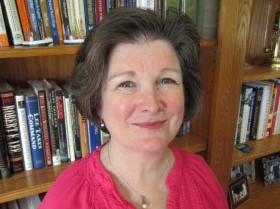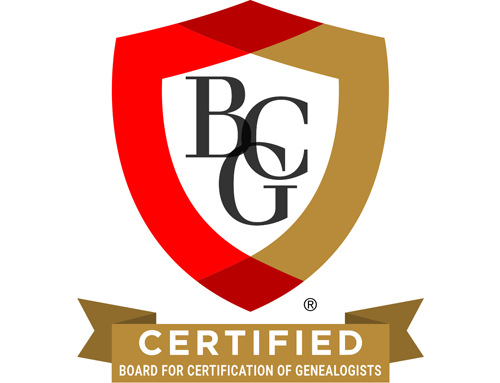Congratulations to Mary O’Brien Vidlak, CG, of Williamsburg, Virginia! A native of New York, Mary serves as Governor-at-Large and Corresponding Secretary of the Virginia Genealogical Society and is a past chairperson of the program committee for the Genealogical Research Institute of Virginia. She is the news coordinator for ProGen Study Group 15. Mary’s certification reflects a longtime interest in genealogy and history. She shares her journey with us:
I was born in Queens, New York, and spent most of my life in Westchester County, a suburb north of the city. The suburbs never felt like home to me; there is a lack of history and roots because everything is new and always changing. Ten years ago my husband and I moved to Williamsburg, Virginia, because we love American history and feel a sense of home in this historic area. I had been working in human resources and planned to continue to do that in Virginia. However the position I wanted didn’t work out, and while I continued to look for a job in my field I took advantage of my time off to explore the areas of Virginia that had been the homes of generations of my maternal ancestors. This literally changed my life. I had always been curious about my ancestors and asked questions, but no one in my family—on either side—really had a strong interest or much specific knowledge. As is the case for most of us, the more I discovered the more I wanted to know.
I quickly realized there was a great deal of information that had no indication of the source. Based on past educational and work experience I knew I wanted to find professional organizations that could teach me how to figure this all out. I joined the National Genealogical Society (NGS) and started with their census course before moving on to the graded version of American Genealogy. In addition to the course material, I read all the recommended material. One of the graders suggested I consider certification, which led to my decision to participate in a ProGen Study Group to increase my knowledge and skill level. I also attended every local, state and national conference I could. My first national conference—NGS in Charleston—was amazing. I recognized how much there was to learn and how frequently incredibly knowledgeable individuals were board-certified genealogists.
Somewhere along the way I created my “strategic plan” and added institutes to my education. I began to pursue genealogy relatively late in life and found the courses themselves and the environment around them an excellent way to ensure I was learning the best practices of the discipline. I was fortunate to be in the final course Barbara Vines Little coordinated at the Institute of Genealogy and Historical Research (IGHR): Virginia Land and Military Conflicts; also, oddly enough, to be in the final Advanced Methodology and Evidence Analysis course that Elizabeth Shown Mills coordinated at IGHR. I have attended the Genealogical Research Institute of Pittsburgh (GRIP) every year but one since its inception, where among other courses I was enrolled in Determining Kinship Reliably with the GPS and Advanced Research Methods, both coordinated by Tom Jones. I also attended the National Institute on Genealogical Research (NIGR) where I found material I used in my portfolio. I got to Salt Lake City for the first time when I attended the Salt Lake Institute of Genealogy (SLIG) in January 2016—after submitting my portfolio. My education will continue this summer when I am back at GRIP!
In many ways my past work and educational experiences have contributed to my success. I was an English Education major at Fairfield University; I ran a small business when my children were young; I worked in human resources at a Fortune 500 company and did a lot of writing and speaking as well as analyzing and correlating information. I enjoy learning new things—and in genealogy I am always learning new things. I also like the challenge of taking research and writing it up in an organized, logical and persuasive way. And genealogy affirms the core belief of my life: every individual is unique, important and valuable, and every life has a story.
One extremely valuable tool I used in educating myself was to purchase CDs from conferences and listen repeatedly to the lectures given by many experts. At times I feel as though I must know them since they spend a huge amount of time driving around with me! As I was working on my portfolio I listened many times to two lectures given at different conferences about preparing your portfolio. Each time I listened I heard something different that helped me with my work.
In addition to the greats of our profession, I have been inspired by people whom I met as classmates, in particular Jean Andrews, CG, and Nancy A. Peters, CG, who sent me encouraging emails and reminded me how much I wanted certification and how great it would feel when I got an email from the BCG Executive Director telling me my portfolio had been approved. I also have to thank Barbara Vines Little whom I ran into at the Library of Virginia one day when she told me to “just send it in!” Outside of genealogy, my husband Michael provided endless encouragement, and my father—who knows almost nothing about his family—fostered my interest in history, which led to my passion for genealogy.
Two suggestions I have for potential applicants—don’t make certification a new year’s resolution so that your deadline is December 31st unless you want to spend your holidays working on your portfolio, and remember that “done is better than perfect!”
Mary is a full time genealogist. She plans to expand her client work and continue to lecture. She also intends to write and publish her own family research. Mary can be reached at movidlak@cox.net.
The words Certified Genealogist are a registered certification mark, and the designations CG, CGL, and Certified Genealogical Lecturer are service marks of the Board for Certification of Genealogists®, used under license by board certificants after periodic evaluation.


